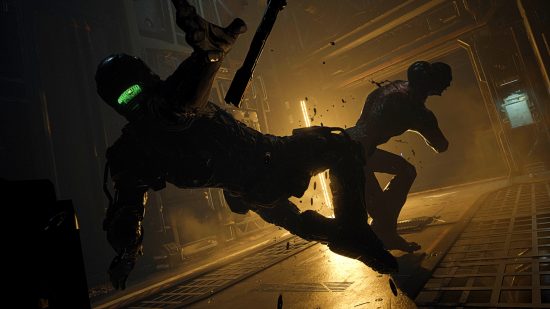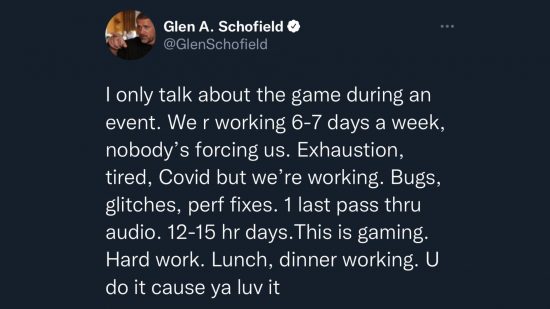A recently deleted tweet from The Callisto Protocol director Glen Schofield, co-creator of Dead Space and former co-director of several Call of Duty games, sparked a discussion about the crisis in video game development over Labor Day weekend in the United States. Joined. Crunch culture has long been the subject of serious debate, especially in the video game industry. Many industry leaders widely criticize the concept of “tap” (working lots of overtime to progress further in development) for causing negative symptoms, such as burnout and depression, in developers who are forced (explicitly or implicitly) to give up a healthy job. the borders.
A tweet from Striking Distance Studios CEO Glen Schofield read (edited for clarity): “Just talking about the game. [The Callisto Protocol] during the event. We work 6 to 7 days a week, no one forces us. Tired, tired, Covid, but we are working. Bugs, crashes, performance fixes. Last step through sound. 12-15 hours of work per day. It’s a hard work game. Lunch, business dinner. You do it because you like it.”
Schofield later deleted the tweet, but several people filed it away, including Bloomberg reporter Jason Schreier, who posted a screenshot tweeter. Schreier lashed out at that sentiment, calling it “weaponized passion” and saying, “That, from a studio executive’s perspective, defines crunch culture. Of course, no one ‘forces’ crazy hours to work. But imagine reduced bonuses and no promotion opportunity if you don’t.” Schreier continues: “That’s why people get burned out on games. [development]”.
schofield then posted a tweet sorry for my previous comment. Following up on him, he says, “I tweeted how proud I am of the effort and hours the team puts in. It was wrong. We value passion and creativity, not long hours. I apologize to the team for going through this.” However, his statement reignited the debate on the issue, especially since it took place on Labor Day in the United States, a holiday dedicated to honoring and recognizing the American labor movement.
Jessica González, founder of the employee organizations A Better ABK and the Game Workers Alliance, says in tweeter“I feel very sorry for the Glen developers. Imagine your studio head posts this. Toxic.” His and Jason’s tweets were just the beginning, as many other development personalities rallied to offer their support and thoughts on the matter. Florent Guillaume, Creative Director, Don’t Nod Speech Schofield’s tweet reminds him of his days at Ubisoft: “Of course we are passionate about our work, but this is how people were forced to fall apart for decades and still are.”
Many developers share Guillaume’s opinion, denouncing the idea of justifying overwork with “passion”. Mayby Jay Sewell, Senior Technical Gameplay Animator at Naughty Dog, echoes Schreier’s terminology: Speech that she calls this effect a “passion fit” and that it “leads to low performance expectations, employee exploitation, burnout, and teaches new developers the same, causing a circular pattern of passion.” Coralie Rosario, Senior UX Designer at Niantic Speech, “Crunch is not a “standard” and is not acceptable. Demonstrating your passion does not mean that you sacrifice everything else for it. I personally see this as a failure of leadership and production, whether your employees agree with it or not.”
Many comments suggest that the perceived need for overtime is due to poor management. Tom Farnsworth, Lead Designer at Bungie Observations that “the crisis is unnecessary and represents a planning failure on the part of the management”. Mikael Hedberg, Technical Director of Minecraft comments“Individual developers get frustrated because they are too passionate to let poor planning ruin projects. This allows poorly planned projects to work, and responsible people who create terrible plans receive bonuses. The cycle continues.” Mike Bithell of Bithell Games add“Crisis is bad and it’s always about management’s inability to accurately scope/budget projects.”
Matt Piscatella from NPD Group more highlighted that “Crunch is not something to be proud of. If it is not expected, it means a failure somewhere in the process. If expected, this represents cruelty. Either way, it’s not good.” Dragon Age: Dreadwolf Creative Director John Epler of Bioware explain how the studio director’s actions can affect his team: “One of the hardest lessons is that when I bite, others bite. Either because I create extra work (assets don’t end with me) or because people see it and think “Oh, I guess that’s an expectation.”
Many developers used the opportunity to encourage their colleagues, especially those in leadership positions, to take the initiative to improve the work. Kayla Arenas, Audio Engineer at Blizzard, formerly of Riot, recounts manufacturers to “create bumpers to prevent creaking and get ahead of schedule. Does the location tell you they need four weeks? Give them a six when plotting your timeline.” TT Games Lead Designer Tim Spencer speaks directly to Schofield. Speech“You have to force your people to work eight hours a day, five days a week, take vacations whenever they want, and escalate/launch date as you see fit.” Carrie Patel, Obsidian Game Director give advice To those in leadership positions: “Don’t normalize abs. Don’t build an unrealistic timeline around your team’s ‘passion’. Don’t weaponize worry. Healthy, high-performing teams make great plays.” and they stay to last a long time.”

Many others in the gaming industry share Carrie’s view that happy, healthy developers make better products. Rami Ismail (former Vlambeer employee) the braces that “no game in the history and future of gamedevs has cost and will cost the health of at least one developer.” Mike Stout, Lead Game Designer at Blizzard Speech, “Over the last 20 years of making games, I have worked hard. It was never worth it. More than once. It hurts people, it hurts the game, and it’s never as effective as proper planning, sizing, and project management. This is the wrong address.”
Andrew Spinks, Lead Developer of Terraria, Speech that “Re-Logic employees only work four days a week, have many days off and frequent bonuses. You should have a life outside of work, no matter how passionate you are.” Ash Lyons, Lead Visual Effects Artist at Gearbox: comments that “problems aren’t solved when you’re overworked.” In fact, a lot of my AH-HA moments didn’t come at work, but when he was looking at the wall or cleaning the kitchen.”
The message seems to be as clear as it was the last time such discussions surfaced: crises are bad for the health of the company’s employees, and ultimately bad for the health of the project. This is something that requires careful management to avoid, and those in positions of authority need to be aware of how their personal willingness to work overtime can affect teams over which they have power.
Hopefully, whenever these conversations come up, they help spread the word a little bit further, both for game developers and for people who play and enjoy video games, so they can better understand the human cost behind creating the things they do. things we all do. love. so much.
On our recent trip to Gamescom, we talked to Trivium’s Matt Heafy about metal in games, explored FromSoftware’s homage to Lies of P, and thought about how the upcoming Hyenas needed more escapism from Tarkov. We also have some recent impressions of Victoria 3 for the upcoming strategy game and an interview with Tempest Rising who talks about the game’s similarities to EA’s Command & Conquer and how its developers hope it will inspire a new installment in its own series. .
Source : PC Gamesn

